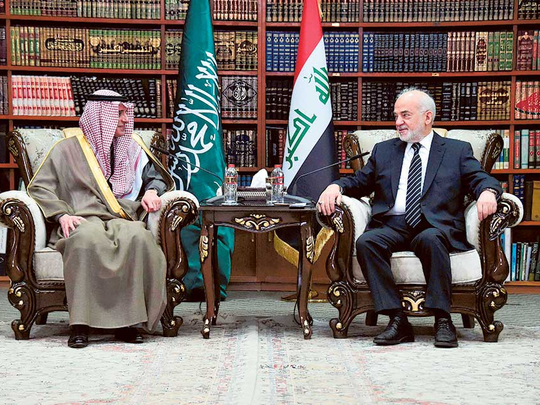
Baghdad: Saudi Foreign Minister Adel Al Jubeir was in Baghdad for talks on Saturday, the first such visit by a chief diplomat from the kingdom in years, Iraqi officials said.
He met his Iraqi counterpart Ibrahim Al Jaafari, a foreign ministry official told AFP on condition of anonymity.
Another government official said it was the first visit to Baghdad by a Saudi foreign minister since 2003, marking a key step in efforts to mend frosty bilateral relations.
“This visit is to reestablish relations in a more stable way than previously,” a senior government official said. “It’s the first visit of its kind.”
Iraq Prime Minister Haider Al Abadi, who has been at the helm since 2014, has supported efforts to improve strained ties.
Thamer Al Sabhan, whose credentials were received in January 2016, became the first Saudi ambassador to Iraq in a quarter century, after relations were cut following ex-president Saddam Hussein’s invasion of Kuwait.
But he left the same year after Baghdad demanded he be removed following remarks he made to the press about an alleged plot to assassinate him and criticism he voiced of the Hashed Al Shaabi.
Hashed Al Shaabi (Popular Mobilisation) forces, which have played a key role in the fight against Daesh, are a paramilitary umbrella dominated by Shiite militia and seen by Riyadh as a proxy for Iran.
Saudi Arabia appointed its first ambassador to Iraqi in a quarter century in January 2016, after relations were cut following ex-president Saddam Hussain’s invasion of Kuwait.
But Thamer Al Sabhan’s posting got off to a rocky start however, with popular anger among Iraq’s Shiite majority over the execution by Saudi Arabia a few days earlier of anti-government Shiite cleric Nimr Al Nimr.
He was summoned shortly after, when he gave an interview in which he criticised the Tehran-backed Shiite militia that make up the bulk of the Hashed Al Shaabi paramilitary force battling Daesh alongside Iraqi security forces.
He also claimed that the militia was planning to assassinate him, angering Baghdad and prompting it to call for his replacement.
In October, Al Sabhan was ‘reassigned’ to Minister of State for Arabian Gulf Affairs at the Ministry of Foreign Affairs.
Abdul Aziz Al Shammari, the former military attaché in Germany, was named as the charge d’affairs in Iraq.
Even though Saddam was ousted in April 2003, relations between Riyadh and Baghdad remained tense, particularly during the presidency of former Iraqi Prime Minister Nouri Al Maliki.
Saudi Arabia warned that American military withdrawal in Iraq would allow Tehran to increase its influence in Iraq under Al Maliki.
After Saddam’s overthrow, Iranian-backed Shiite factions have risen to power, fulfilling Riyadh’s apprehensions.
Iraq also has strong ties to Syria, Iran’s only Arab ally, which the Arab League has suspended over President Bashar Al Assad’s violent suppression of an 11-month-old uprising.
Saudi Arabia has been a chief supporter of rebel groups opposed to Al Assad’s rule.












